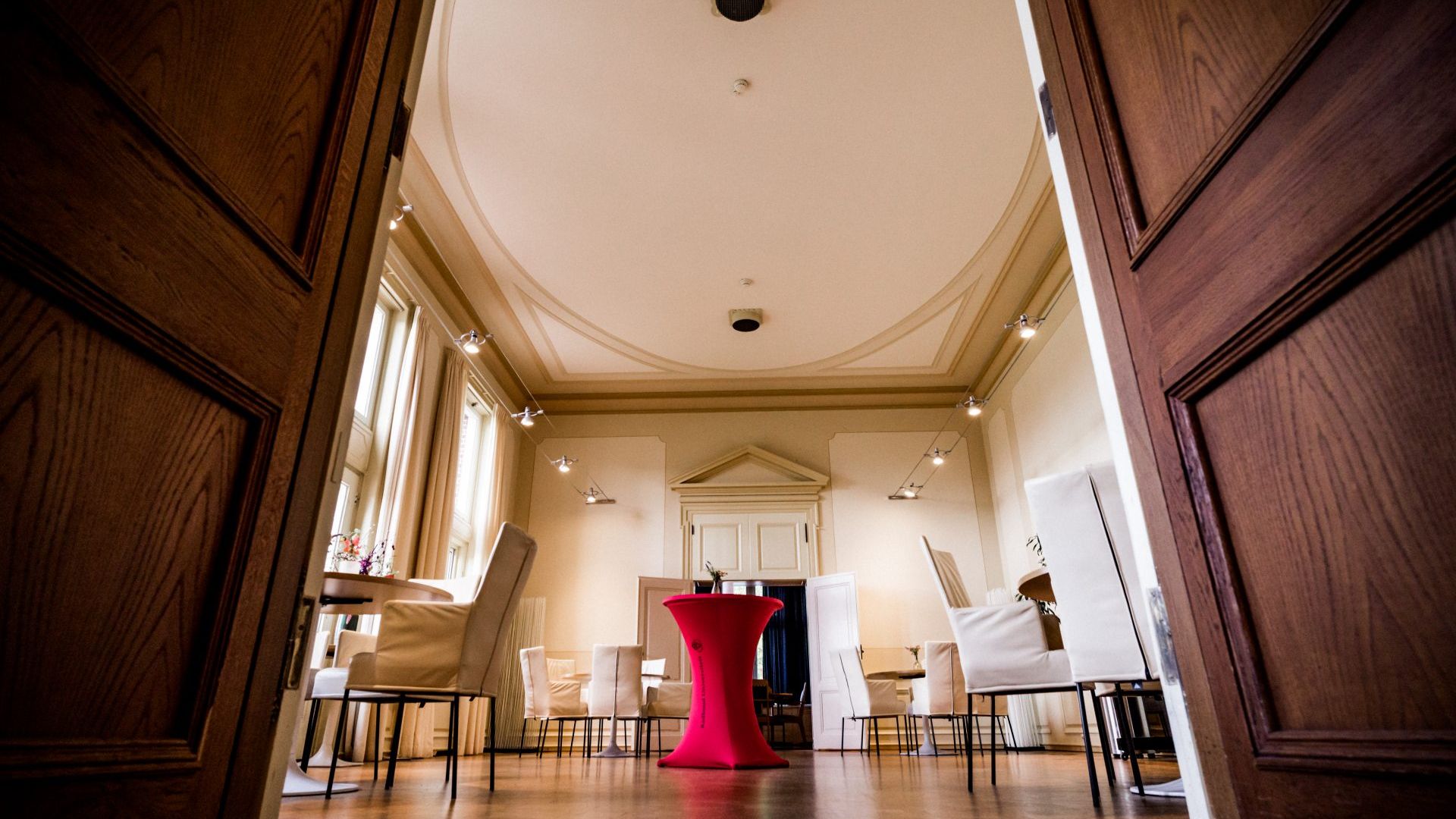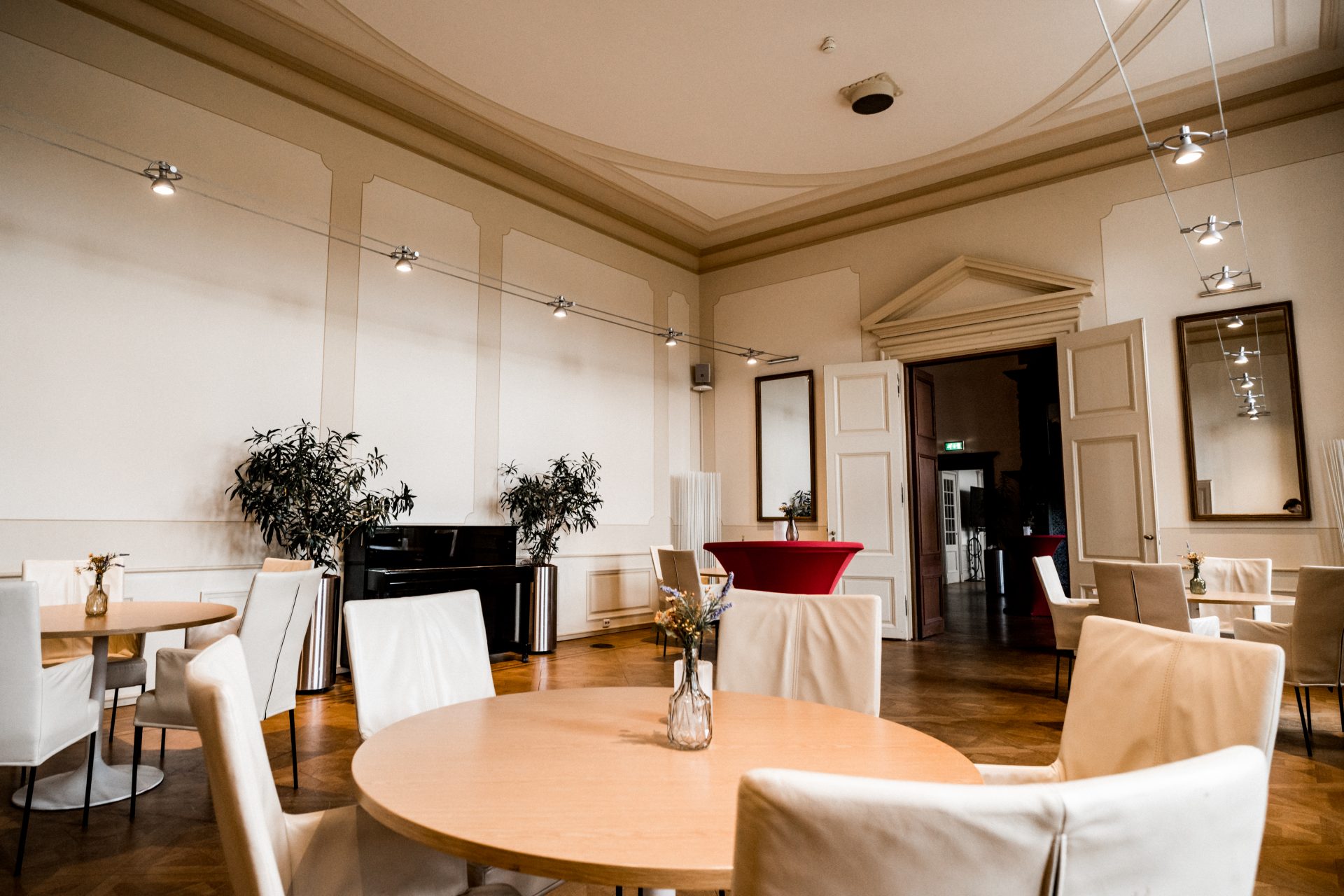Radboud’s glamorous Beel chamber carries history of colonial violence. Should it be renamed?
-
 The Beel chamber. Photo: Johannes Fiebig
The Beel chamber. Photo: Johannes Fiebig
The Executive Board is pondering the future of the Beel chamber in Huize Heyendael. The former prime minister and Nijmegen professor after whom the room is named was ultimately responsible for colonial violence in Indonesia. Historians Jan Brabers and Ronald Kroeze were asked to contribute to a possible new text sign for the conference room.
‘It’s high time to rename the Beel chamber in Huize Heyendael and remove Beel’s portrait from the Grotius building,’ wrote Professor of Mathematical Physics Klaas Landsman in February in NRC and on voxweb.nl.
Louis Beel was prime minister and professor at the Catholic University Nijmegen (now Radboud University). As a prime minister, he was ultimately accountable for the extreme violence during the Indonesian National Revolution. This was supported by a report published by NIOD and other organisations in February.
‘The room was not named to honour Beel, but the University’
In an interview with Vox, David Van Reybrouck, author of Revolusi, a hefty volume on the Indonesian National Revolution, argues that Beel has ‘seriously fallen from his pedestal’ as far as he is concerned. According to the Belgian author, Beel was an evil genius in the struggle for decolonisation. He was prime minister during the first wave of police actions in 1947, and High Commissioner for the Crown in Jakarta during the second wave in 1948. These facts led Van Reybrouck to proposing that the University should establish a committee to advise it on how to deal with historically controversial names.
Best university of the Netherlands
The room in Huize Heyendael was named after Louis Beel in 2005, explains Radboud University historian Jan Brabers, who was involved in the naming at the time. ‘The reason was not that he was such a good prime minister, but that he – just like Jo Cals, Victor Marijnen, and Dries van Agt – had studied here and later become prime minister,’ explains Brabers. ‘One of the primary motives for the University’s foundation was the wish to create a Catholic administrative elite. These policy-makers were a personification of this ideal. The room was not named to honour Beel, but the University.’
Brabers remembers former President of the Executive Board Roelof de Wijkerslooth saying in speeches that Radboud University was the best university of the Netherlands, because it had produced the greatest number of prime ministers. ‘He was joking of course, but with a serious undertone.’
But is this enough reason to continue to have a room named after this particular prime minister? Brabers finds it a difficult question. ‘I thought it was a nice idea at the time: After all, aren’t we proud of this fact? It doesn’t mean that we’re trying to exonerate the mistakes committed in Indonesia.’
‘Not an advisory committee’
The Executive Board hopes to reach a decision concerning the future of the Beel chamber before the end of this year, says a spokesperson. In preparation, the Board has requested the help of Brabers and Ronald Kroeze, Director of the Centre for Parliamentary History. The two historians were asked to produce a short text on Louis Beel’s administrative career, potentially to be printed on a sign in or at the entrance of the Beel chamber. This text is currently awaiting approval from the Executive Board and has therefore not yet been made public. ‘We were not asked to advise on whether the room should continue to bear Beel’s name,’ say Kroeze. He emphasises that the Executive Board is responsible for deciding about the future of the Beel chamber. But if the room does keep its name, what would be a suitable text?
The text that Brabers and Kroeze produced about Louis Beel, and which the Executive Board is now considering, consists of three paragraphs. ‘Our explanation is provocative, but also objective and scientific,’ explains Brabers. ‘It may lead to a discussion, but we tried to be as truthful as possible.’
In their text, the historians list the black pages from Beel’s administrative career. Kroeze: ‘The reports published recently about Indonesia speak of a broad group being responsible, with politicians and administrators in higher positions within the administrative hierarchy bearing most of the responsibility. After all, they initiated the military interventions and did too little to stop the violence. The military leaders were also heavily accountable because the various army units were under their direct command. Finally, the study also points out that some of the responsibility lay with the commanders, officers, and soldiers. There is now more or less general consensus on this.’
But the text goes further than this. ‘After all, you can bring in all sorts of nuances, without exonerating Beel,’ says Brabers. ‘He was under heavy pressure from the business and political elite to hold on to the colonial policy, and from the military leaders to strike back hard.’ A lot of pressure also came, according to Brabers, from Queen Wilhelmina. ‘Beel was very sensitive to this.’
‘A person is always multicoloured,’ says Brabers. ‘There is something unsatisfactory in judging Beel solely on this one aspect of his life. This is why our sign also mentions that he was an administrator in Eindhoven during World War II when a member of the NSB was appointed mayor. In response, Beel resigned, for reasons of principle. This speaks in his favour, morally speaking.’
Endless discussion
Will the Executive Board ultimately decide to rename the conference room, or will they retain Beel’s name with an explanation concerning his time as administrator? Historians Brabers and Kroeze wouldn’t dare to hazard a guess at this point. Either way, they don’t expect the controversy to end once the Board reaches a decision. ‘History is an endless discussion,’ says Brabers. ‘If you rename the room, you can still talk about why you did it. This kind of discussion doesn’t just die down.’
‘This brings the risk of later regretting your choice of name’
The historians hope therefore for a broader discussion concerning the naming of rooms, buildings, and streets on campus. Kroeze: ‘When Van Reybrouck was in Nijmegen, he noted how little people in the Netherlands know about their own colonial past. A new sign with more information might contribute to spreading more knowledge about this past.’ However, says Kroeze, the question remains whether naming rooms after persons is the best way to achieve this.
Brabers adds: ‘As far as I know, buildings and rooms have always been named quite randomly. We have buildings here named after Erasmus and Thomas of Aquino, while at the Berchmanianum, there are rooms named after alumni. This brings the risk of later regretting your choice of name. There is always something to find fault with in someone.’






